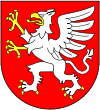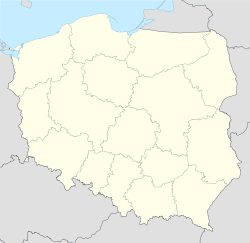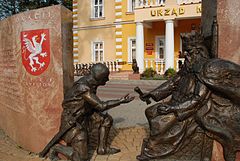- Dębica
-
Dębica Dębica town hall 
Flag
Coat of armsCoordinates: 50°3′N 21°25′E / 50.05°N 21.417°E Country  Poland
PolandVoivodeship  Subcarpathian
SubcarpathianCounty Dębica County Gmina Dębica (urban gmina) Established 13th century Town rights 1358 Government - Mayor Paweł Wolicki Area - City 34.14 km2 (13.2 sq mi) Highest elevation 407 m (1,335 ft) Lowest elevation 176 m (577 ft) Population (2006) - City 47 234 - Density 1,413.52/km2 (3,661/sq mi) - Metro 75,000 Time zone CET (UTC+1) - Summer (DST) CEST (UTC+2) Postal code 39-200 to 39-210 Area code(s) +48 14 Car plates RDE Website http://www.debica.pl Dębica [dɛmˈbit͡sa] (Yiddish: דעמביץ-Dembitz) is a town in southeastern Poland with 46,693 inhabitants, as of 2 June 2009.[1] It is the capital of Dębica County. Since 1999 it has been situated in the Subcarpathian Voivodeship; it had previously been in the Tarnów Voivodeship (1975–1998).
Contents
Area
According to the 2006 data, Dębica's area is 33.81 square kilometres (13.05 sq mi). 42% is arable land, forested areas make 19%. Dębica is the seat of the county, and the town covers 4.34% of the county's area.
History
Beginnings
One of the oldest documented references to this area dates back to 1293, which records a settlement by the name of 'Dambicha'.[2] In 1358 the Polish king Kazimierz Wielki gave Świętosław Gryfita permission to construct a town, and Dębica was officially founded.[2][3] For many years it was a small and unimportant place, located in the Pilzno County, Sandomierz Voivodeship, province of Małopolska. Lacking fortifications that would defend it, Dębica was vulnerable to various invasions of the Tatars, Swedes, or Hungarians, who burnt or ransacked the town every few years. As a result of these events, there are few historical monuments in Dębica. One of these is the Saint Jadwiga church, originally from the 14th century, but completely rebuilt in late 19th century. Jewish settlers arrived in 1676–1690, expanding the town's population, and had a significant positive influence on the town's economy.[2]
Under Austrian rule
In 1772, following the first partition of Poland, Dębica found itself in the Habsburg Empire, in newly created province of Galicia (Polish: Galicja). New Austrian authorities decided that it should no longer be regarded as a town, but rather a village and renamed it Dembitz. This decision marked the decline of the town.[2]
The bad times came to an end in the second half of the 19th century, when Austrian government decided to build a main West-East railroad line, connecting two major urban centres of Galicja - Kraków and Lwów. A railroad station was built in Dębica, and at the end of the 19th century, another, Northbound line was constructed, joining Dębica and the town of Sandomierz, which was located on the Austrian-Russian boundary. The town became a rail junction, which was a huge boost for its citizens.
In 1900 a high school was opened, and in 1908 students from this school founded one of the oldest sports clubs in Poland, Wisłoka (whose name comes from the River Wisłoka, which flows by the town).
Just before World War I, Dębica was again incorporated as a town. The war was a disaster for the town, as it was almost completely destroyed. During several campaigns Dębica was occupied by Russian, Austrian, Hungarian and German troops, which fought in this area for many months. The Russians wanted to get through the Carpathian Range towards Slovakia, Bohemia and Hungary, the Central Powers managed to stop them at the beginning of 1915. These events had a great impact on the town and hampered its development for many years.
In Independent Poland
In 1918, after Poland regained independence, Dębica was included in the newly created Kraków Voivodeship (see: Kraków Voivodeship (1919-1939)), in the powiat (county) of Ropczyce. The economical situation of the town did not change - there was no industry, very few jobs available and surrounding villages were strongly overpopulated. This started to change in 1936, when Polish government announced creation of Centralny Okręg Przemysłowy (Central Industrial Area). It was a huge public works project, aimed at fighting unemployment in this overpopulated part of Poland, as well as creating heavy industry, concentrated on production of armament.
Dębica started to develop very fast—so fast, that in 1937 the county's capital was moved here from Ropczyce. Among several factories built in the town then, the most important was "Stomil" (now it is called Tire Company "Dębica" and it belongs to the Goodyear). Other factories were: Wytwórnia Urządzeń Chłodniczych WUCh and Zakłady Tworzyw Sztucznych "Pustków", built from scratch, together with workers' settlement, in a forest some 15 kilometres (9.3 mi) northeast of Dębica.
Sometime in 1938 or 1939 works on another rail connection from Dębica to Jasło, via Pilzno were started. Unfortunately, the Second World War stopped this construction, and after the war it was not continued.
World War II
German occupation of Dębica started on September 8, 1939. The Germans created a ghetto for town's numerous Jewish population (est. 1561), eventually killing most of them either on the spot or in Auschwitz. In the forested hills south of the town, strong underground forces operated, with numerous units of Armia Krajowa (Home Army). It was too dangerous for AK's officers to stay in Dębica, thus the headquarters of a local underground district (known as "Deser") were located at a nearby village of Gumniska, located in the hilly area south of the town. Resistance fighters were very active here, often attacking the main Kraków-Lwów rail line, used by German troops. In early 1944, units of local Armia Krajowa district unsuccessfully tried to blow up a train with Hans Frank, which was passing through the village station at Czarna, some 15 km west of Dębica. As a reprisal, on February 2, 1944, the Germans murdered 50 Poles by rail track in Dębica (also see Otto Schimek).
Communist Poland
After the war, in new, Communist Poland, Dębica again became seat of a county, but the town was moved from Kraków to Rzeszów Voivodeship. War destruction again stopped town's development, but recovery this time was fast and based on pre-war factories. In 1975, after administrative reform, counties in Poland ceased to exist and were replaced by numerous and small Voivodeships. Dębica again was moved - this time from Rzeszów to the newly created Tarnów Voivodeship.
In the late 1970s Dębica gained importance as a centre of food and agriculture production. This was due to creation of Kombinat Rolno-Spozywczy "Igloopol", which, under an influential Communist dignitary Edward Brzostowski, developed very fast and in an impressive way. Igloopol built a huge factory and a completely new district of Dębica, with numerous condominiums, located on the northern side of rail line. The company achieved its peak in the late 1980s. After collapse of Communist regime, it was divided into several smaller firms, controlled by former Communist activists.
Dębica is now located in the Subcarpathian Voivodeship. The town bore the brunt of change of the political system. Unemployment rate is high, local government has been unable to tackle this problem. Hundreds of young people have decided to leave, mainly to USA, United Kingdom and Germany.
Sports
There are two major sports clubs in Dębica. Klub Sportowy (Sports Club) Wisłoka, founded in 1908, is one of the oldest sports organizations in the country. Wisłoka is famous for its wrestlers, who have won numerous medals in the Olympic Games, World and European Championships. Other fields in which Wisłoka's athletes achieved significant achievements are: soccer, boxing, cycling and karate. The club was sponsored by Tire Company Dębica and it had its heyday in the 1970s.
Other team, Ludowy Klub Sportowy Igloopol, was founded in 1978 and is the brainchild of a prominent activist of Polish communist party, Edward Brzostowski. Igloopol enjoyed strong support from the local government. Brzostowski was for some time Minister of Agriculture and director of Polski Zwiazek Pilki Noznej (Polish Football Association), so his favorite team prospered in soccer as well as in boxing, achieving significant successes. Igloopol's best years, late 1980s, are closely associated with peak of its sponsor.
Lately, both teams played in regional, Subcarpathian 4th Division, hoping to win promotion. Finally, Wisłoka achieved this goal and in the season 2006/2007 plays in the fourth group of Polish 3rd Division.
Economy
Since the mid-1930s, Dębica, in spite of its size, has been an important industrial centre of Poland. There are several companies located in the town and its proximity:
- Firma Oponiarska Dębica S.A. (Tire Company Dębica), previous name - Stomil Dębica,
- Wytwornia Urzadzen Chlodniczych WUCh (Freezer Appliances Producer WUCh),
- Food companies such as Zaklady Miesne (Meatworks), Igloomeat and Animex Poludnie,
- chemical industry (paint producers such as Polifarb Dębica and Sniezka Brzeznica),
- marble producer Jabo Marmi and brickyard Iglobud,
- bicycle maker Arkus,
- Sportatut - producer of sports nutritionals.
Famous personalities connected with Dębica
Dębica is the birthplace of 20th century composer Krzysztof Penderecki.
Other personalities connected with the town are:
- Tadeusz Łomnicki, one of the most popular Polish actors, who attended Dębica's high school,
- Greco-Roman wrestlers, twins Kazimierz Lipień and Józef Lipień, who while representing Wisłoka in the 1970s, won numerous medals in various international tournaments, including the Olympic Games,
- Leszek Pisz, a midfield soccer player, who started his career in Wisłoka. He played in Igloopol, Legia Warszawa, several Greek teams and in Polish National Team.
- Mateusz Borek, famous sports comentator.
- Władysław Strumski, Polish writer.
- Ryszard Siwiec, born in Dębica, who committed suicide by self-immolation in protest against the Soviet-led invasion of Czechoslovakia.
- Seweryn Gancarczyk, football defender.
- Waldemar Piatek, football goalkeeper.
- Jerzy Żuławski, who died in Dębica and was buried there.
- Pawel Wolak, professional boxer, nicknamed "The Raging Bull."
Education
- Wyższa Szkoła Informatyki i Zarządzania in Rzeszów, branch in Dębica
- University of Economics in Kraków, branch in Dębica
Transport
Dębica is located on the main west-east European highway E40, which goes from Belgium, across Germany and Poland, to Ukraine. However, the E40 is not regarded as a highway in Dębica area — it is in Western standards, just a regular, one-lane main road. However, unlike in many Polish towns and cities, the E40 traffic does not enter the centre of Dębica. In mid-1980s a by-pass road was built on southern outskirts of the town. Other Polish cities located by the E40 highway are Wrocław, Opole, Katowice, Kraków, Tarnów, Rzeszów and Przemyśl. Dębica is also connected with Mielec and Tarnobrzeg thanks to the local road number 985.
In the future, the A4 highway will run just the to the north of the city. There will be two exits from the highway for Dębica. It is expected to be completed by 2012.
International relations
Twin towns - Sister cities
Dębica is twinned with:
See also
References
- ^ "Population. Size and structure by territorial division". © 1995-2009 Central Statistical Office 00-925 Warsaw, Al. Niepodległości 208. 2009-06-02. http://www.stat.gov.pl/cps/rde/xbcr/gus/PUBL_P_population_size_structure_31_12_2008.pdf. Retrieved 2009-06-22.
- ^ a b c d Urząd Miejski w Dębicy (2011 [last update]). "Urząd Miejski w Dębicy - oficjalna strona internetowa". debica.pl. http://www.debica.pl/index.php?strona=english&podstrona=152. Retrieved 1 October 2011.
- ^ Spuscizna.org (2007 [last update]). "History of Debica County, Podkarpackie Province, Poland". spuscizna.org. http://spuscizna.org/spuscizna/history-obserwator.html. Retrieved 1 October 2011. "King Kazimierz Wielki who gave many founding privileges and location documents for Polish fortified castles, in 1358 gave to Swietoslaw of Gryfit clan the privilege of founding "Debica Town" which came to existence in 1372."
Coordinates: 50°03′N 21°25′E / 50.05°N 21.417°E
Seat Dębica (urban gmina)
Urban-rural gmina Rural gminas Seat (not part
of the gmina)Dębica
Villages Bobrek • Braciejowa • Brzeźnica • Brzeźnica-Wola • Głobikowa • Gumniska • Kędzierz • Kochanówka • Kozłów • Latoszyn • Nagawczyna • Paszczyna • Podgrodzie • Pustków • Pustków Osiedle • Pustków-Krownice • Pustynia • Stasiówka • Stobierna • ZawadaCategories:- Dębica
- 1358 establishments
- Populated places established in the 1350s
- Cities and towns in Podkarpackie Voivodeship
- Dębica County
Wikimedia Foundation. 2010.




